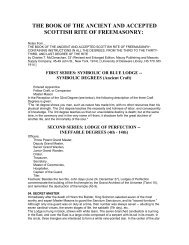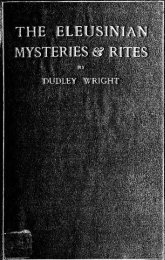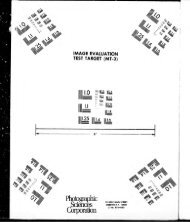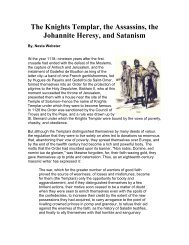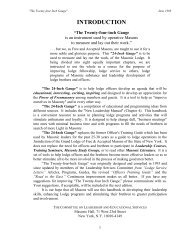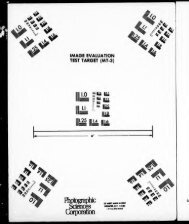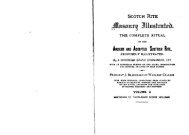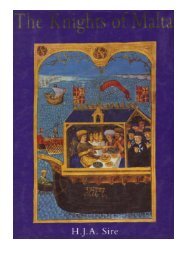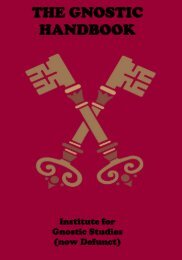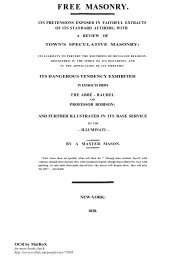The History of Initiation - The Masonic Trowel
The History of Initiation - The Masonic Trowel
The History of Initiation - The Masonic Trowel
You also want an ePaper? Increase the reach of your titles
YUMPU automatically turns print PDFs into web optimized ePapers that Google loves.
THE MYSTERIES OF BACCHUS. 107<br />
58<br />
illustrations <strong>of</strong> the like tendency, the aspirant was dis-<br />
59<br />
missed through the<br />
beautiful gate<br />
<strong>of</strong> the Temple with the<br />
two barbarous words Koy$ and Ofinal, which are said to<br />
mean, WATCH and ABSTAIN FROM EVIL, 60 as a person<br />
mysteriously regenerated, and placed in future under the<br />
protection <strong>of</strong> the celestial gods.<br />
It is admitted by many learned writers that the G recian<br />
facts in the life <strong>of</strong> the Jewish<br />
mysteries contained many<br />
lawgiver. Thus Bacchus is described as having been<br />
taken from a chest or ark and as ; being the son <strong>of</strong> two<br />
mothers ; because Pharaoh's daughter was like a second<br />
mother to Moses. <strong>The</strong> deliverance <strong>of</strong> the Israelites from<br />
their bondage in Egypt is another remarkable coincidence.<br />
In the Dionysiaca, the thyrsis or Kod <strong>of</strong> Bacchus<br />
was elevated, to perpetuate the remembrance <strong>of</strong> two remarkable<br />
miracles which were reputed to have been performed<br />
with this all-powerful instrument. On one occasion<br />
61 he cast his rod upon the ground and it became a<br />
serpent ;<br />
62 and afterwards he struck the two rivers Orontes<br />
63 and Hydaspes with it, and the waters immediately re-<br />
he was cast into hell. Now Juno is Juneh, the dove, (Fab. Mys. Cab.,<br />
vol. i., p. 83,) which was seized by Noah; and his punishment on a re-<br />
volving wheel in hell, merely referred to his descent into. the Hades <strong>of</strong><br />
the mysteries, and his circumambulating progress through the caverns<br />
<strong>of</strong> initiation.<br />
58 A pr<strong>of</strong>usion <strong>of</strong> symbols which adorned these mysteries may be<br />
kC<br />
and<br />
found in the " Signs and Symbols,"<br />
<strong>The</strong>ocr. Phil, <strong>of</strong> Free-<br />
masonry."<br />
59 <strong>The</strong> caverns <strong>of</strong> initiation had two gates ; one called the descent to<br />
hell, the other the ascent <strong>of</strong> the just ; which, in the passage already<br />
cited from Homer, are inaccurately described. Mr. Pope has inverted<br />
the sense <strong>of</strong> the original, where he makes the gods, or in other words<br />
the Epoptae, descend instead <strong>of</strong> ascend, and mortals enter instead <strong>of</strong><br />
descend. Thus, corrected, the reference is perfectly easy to the destruction<br />
<strong>of</strong> the antediluvians and the safety <strong>of</strong> the eight just persons,<br />
who hence have been dignified with the name <strong>of</strong> immortals. (Vid. ut<br />
supra, p. 72.)<br />
60 Vid. Bibl. Univ., torn, vi., p. 86. Warb. Div. Leg., vol. i., p. 156.<br />
''When the rites <strong>of</strong> the east were imported into Greece," says Mr.<br />
Faber, "a strong charge was given that barbaric names should never<br />
be changed; concerning which injunction- it is observed by Psellus,<br />
that there are sacred names <strong>of</strong> ineffable import, preserved in the<br />
mysteries <strong>of</strong> every nation, and delivered to them immediately by the<br />
gods ; a circumstance which makes it unlawful to translate them into<br />
the Greek language." (Mys. Cab., vol. i., p. 116.)<br />
61 Non. in 62<br />
1. Dionys., 25. Vid. Exod. iv. 3.<br />
63 Non. in Dionys., 1. 23.



